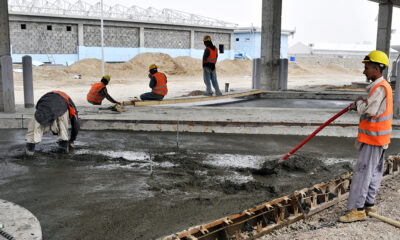Latest News
Sceptics warn Washington’s new peace plan could backfire
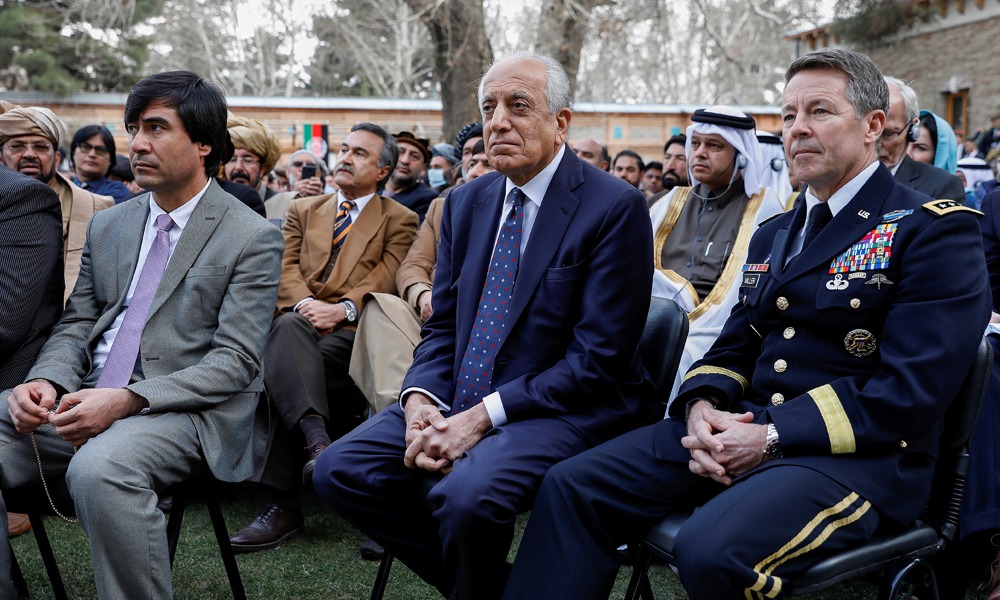
Some Afghan officials have warned that Washington’s aggressive push for a political settlement could backfire, by deadlocking talks, undermining the elected government and plunging the country deeper into violence, the Washington Post reported.
According to the Post, Washington’s approach – nicknamed “moonshot” by some US officials because of its lofty ambitions – is an attempt to get the two sides to agree to a political settlement in just a matter of weeks.
The approach — nicknamed “moonshot” by some U.S. officials referring to its lofty ambitions — is an attempt to reach a peace deal within weeks by applying unprecedented pressure to negotiating teams on both sides of the conflict, the Taliban and the Kabul government.
According to the Post, Afghan officials are concerned a hasty withdrawal of troops without a political settlement could tip the balance – risking a repeat of the mistakes of the 1990s, when Afghanistan was plunged into civil war following the abrupt withdrawal of Soviet troops.
Speaking on condition of anonymity to the Post, Afghan officials acknowledged that current levels of violence and the stalled peace talks between the Afghan Republic and the Taliban in Doha are unacceptable. However they disagreed with the Biden administration’s efforts to speed up the process.
One Afghan official warned: “The consequences for us are the collapse of the state, sudden destruction and a very long and intense civil war.”
“The fact that it has happened in the past once shows it could happen again,” he said.
A second official said “pushing the peace now with this new initiative very rapidly” risks undermining the country’s military.
He said he fears “bringing back the old mujahideen at the expense of the Afghan security forces,” referring to the militant factions and irregular fighters who fought the Soviet forces, then turned on each other during the civil war.
Signs point towards a delay in withdrawing foreign troops
The Post stated however that the accelerated push for a settlement is taking place amid growing indications that the United States is considering postponing the withdrawal of U.S. troops.
But Washington has said a final decision on the future of U.S. troops in Afghanistan has not yet been made.
The Post meanwhile reported that a spokesman for President Ashraf Ghani’s office rejected the suggestion that the president is under greater pressure now from Washington to reach a peace deal.
“If there is any pressure that we feel, it is the pressure from the Afghan people who have been terrorized” since the Soviet invasion in 1979, said Fatima Murchal, Ghani’s deputy spokesperson.
Taliban representatives in Doha also dismissed the implication that the change in approach would have an effect on long-stalled talks.
“Pressure from the United States never works,” said Mohammad Naeem, the spokesman for the Taliban’s political office. “We know this because they have already tried all forms of pressure for 20 years.”
According to the Post, Naeem said the group does not expect the United States to walk away from the 2020 deal, but if it does, “there will be problems, and they will be responsible for that.”
But U.S. officials say the potential risks of inaction outweigh an opportunity to accelerate the process.
The new approach of “moving at a faster pace toward a political agreement,” said one U.S. official, is “the best option for moving forward.”
“Given where we are, the alternative is more dangerous,” he said.
On the recent letter and draft peace proposal sent by US Secretary of State Antony Blinken to Ghani and other officials and to the Taliban, outlining a plan for a transitional government, the Post reported that this all “came as a shock”.
“It’s not what we have been promised,” said an Afghan official with knowledge of the talks, who described the tone of the leaked letter as “upsetting” and contrary to the more consultative approach Kabul was expecting from the Biden administration.
The Afghan government had called on the Biden administration to conduct a full review of the peace agreement signed between the Taliban and the former Trump administration – an agreement that excluded the Afghan government.
But, one peace talks negotiator Fatima Gailani told the Post in reference to Ghani’s government that “they were hoping for a miracle.”
She said Afghan leaders should not have been surprised by the U.S. pressure campaign, given President Joe Biden’s past comments on his desire to end the war in Afghanistan.
Now, she said, the letter and draft peace document “brought reality out into the open” and could act as a wake-up call to unify Afghanistan’s political parties.
The Post also stated that reactions in Kabul to the letter and peace plan appears to be exposing widening political fault lines, rather than signaling moves toward consensus.
Ghani’s main rival, Abdullah Abdullah, the chairman of the High Council for National Reconciliation, welcomed the new U.S. proposal.
His spokesman Mujib Rahman Rahimi said: “It is a positive starting point to boost the peace process and the peace talks.”
“We do not consider the proposal a setback or a step to destabilize the country. Rather, it is a step forward,” Rahimi said.
The new proposal was delivered almost two weeks ago by US peace envoy Zalmay Khalilzad to Ghani, the Abdullah and other politicians and former government leaders. Later in the week Khalilzad met with Taliban representatives in Doha and put the plan to them.
No decisions have yet been made by either side on the proposal.
Latest News
Moscow’s move a ‘significant step toward recognizing Afghanistan’s political realities’, says Haqqani
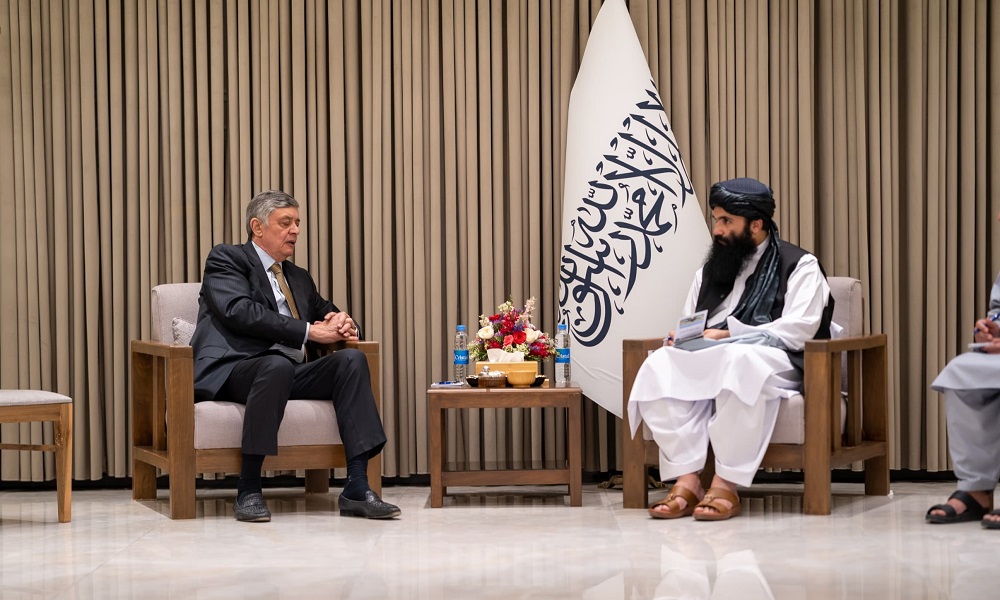
Acting Minister of Interior Sirajuddin Haqqani on Wednesday met with Zamir Kabulov, Russia’s special envoy for Afghanistan, and Dmitry Zhirnov, Russia’s ambassador to Kabul.
Haqqani expressed appreciation for Moscow’s recent decision to remove the Islamic Emirate from its list of terrorist organizations. He described the move as “a significant step toward recognizing the political realities of Afghanistan.”
In a statement, the interior ministry said that both sides emphasized the importance of upgrading diplomatic relations to the level of embassies and reaffirmed their commitment to mutual cooperation in the fields of security and trade.
During the meeting, the two parties also discussed regional and bilateral cooperation in the areas of security, economy, and commerce, and stressed the need to strengthen ties between the two countries.
Latest News
Special meeting will be held to launch Afghanistan–Russia joint commission, says Kabulov
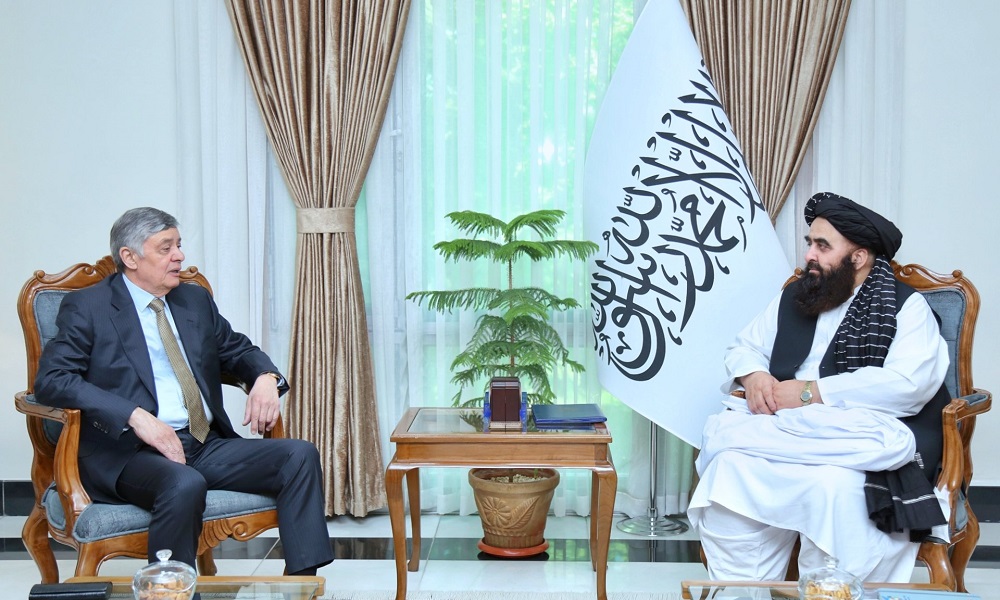
Zamir Kabulov, Russia’s special envoy for Afghanistan, on Wednesday met with Afghanistan’s Acting Minister of Foreign Affairs Amir Khan Muttaqi in Kabul and said a special meeting will be held on the sidelines of the Kazan Forum to officially launch the permanent joint commission between Russia and Afghanistan.
According to a statement issued by the Afghan foreign ministry, Kabulov said that expanding relations with Afghanistan is important to Russia, and for that purpose, Moscow has taken steps to remove obstacles in the path of developing bilateral ties.
This comes after Moscow last week removed the Islamic Emirate from their list of militant organizations.
During the meeting, Muttaqi expressed appreciation for Russia’s recent move to remove the IEA from its list of banned organizations and stated that the Islamic Emirate will soon appoint a diplomat at the ambassadorial level to serve in Moscow.
The two sides also discussed enhancing bilateral relations between Afghanistan and Russia, expanding economic and trade cooperation, and addressing certain regional issues.
The 16th International Economic Forum “Russia – Islamic World: Kazan Forum” will be held from May 13 to 18 in the city of Kazan, Russia. Afghan products and goods will be showcased at the event.
Latest News
Balochistan business chamber asks Islamabad to issue work permits to Afghan refugees
This comes amid Pakistan’s ongoing campaign to expel hundreds of thousands of Afghan refugees living in the country.
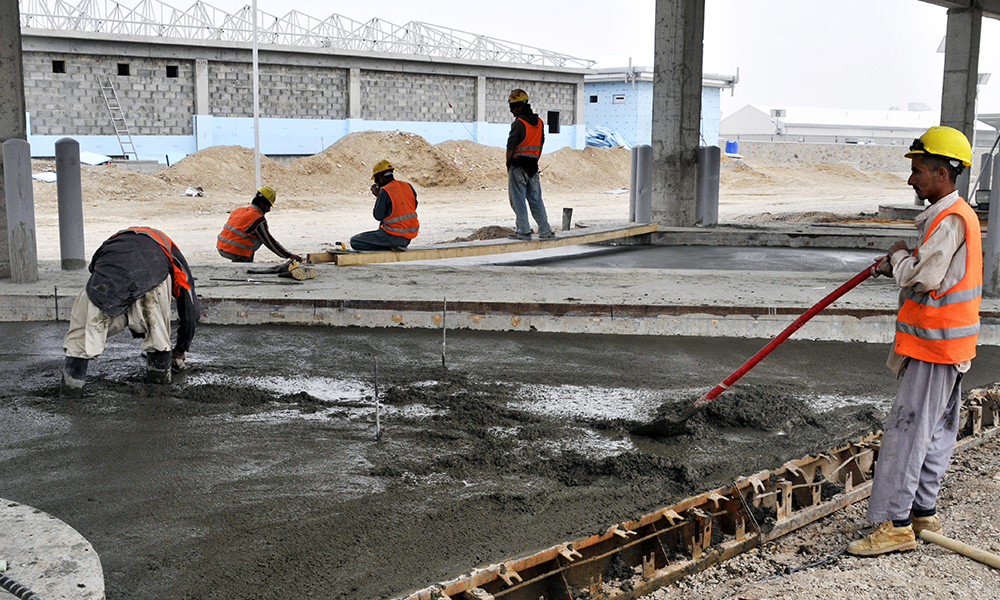
The Balochistan Chamber of Commerce and Industry in Quetta, Pakistan, has appealed to the federal government to issue work permits to skilled Afghan refugees who work in various sectors including mining and agriculture.
Haji Akhtar Kakar, the vice president of the chamber of commerce and industry, made the request while pointing out that the existing shortage of skilled labour could worsen further if the issue was not addressed promptly, Dawn news reported.
This comes amid Pakistan’s ongoing campaign to expel hundreds of thousands of Afghan refugees living in the country.
Akhtar said however that due to Balochistan’s deteriorating security situation, mine owners, farmers and industrialists have had to rely on Afghans for skilled labor as Pakistani workers from other provinces were reluctant to move to Balochistan.
According to him, the decision to expel Afghan refugees had severely impacted the agriculture, mining, and industrial sectors in Balochistan, as a significant portion of the workforce came from Afghanistan.
-

 Sport4 days ago
Sport4 days agoAfghanistan qualify for U19 Cricket World Cup 2026
-

 Regional5 days ago
Regional5 days agoDeadliest US strike in Yemen kills 74 at oil terminal, Houthis say
-

 World4 days ago
World4 days agoThousands of protesters rally against Trump across US
-

 World4 days ago
World4 days agoIran, US end nuclear talks in Rome, agree to meet next week
-

 Latest News3 days ago
Latest News3 days agoPolio vaccination campaign launched in Afghanistan
-

 International Sports3 days ago
International Sports3 days agoIPL 2025: 14-year-old Vaibhav Suryavanshi becomes youngest IPL player
-

 Latest News2 days ago
Latest News2 days agoChina invites various Afghan delegations to attend Shanghai forums
-

 International Sports1 day ago
International Sports1 day agoIPL 2025: Robo-Dog ‘Champak’ explained










